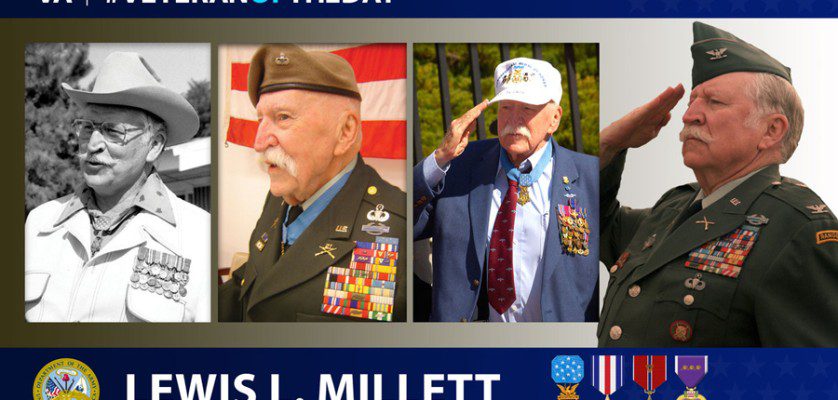Lewis Millett was born in December 1920 in Mechanic Falls, Maine, and was raised in South Dartmouth, Mass. Enlisting in the Massachusetts National Guard in 1938, Millett continued his family tradition of service in the military—his great-grandfather served during the Civil War and his uncle served during World War I. Describing his uncle, he said that he “always thought of him as a hero” and that his uncle was “one reason [he] joined the Army.”
In the National Guard, Millett served as a clerk. Then, shortly after graduating from high school, he joined the Army Air Corps in 1940, attending Gunnery School. With the U.S. having not yet joined World War II, however, Millett, hoping to combat the Nazis, deserted his post in 1941, leaving for Canada to support that country’s war efforts. Deployed to Europe, he was a part of the Royal Regiment of Canadian Artillery before transferring back to the U.S. Army after U.S. entry into the war. With the U.S. Army, he took part in the American invasion of North Africa, serving as an anti-tank gunner and earning a Silver Star for driving a burning vehicle filled with ammunition away from fellow soldiers.
After serving in Tunisia, Millett deployed to Italy. While he was there, the Army discovered Millett’s earlier desertion, finding him guilty in a court-martial. He later laughed while explaining this, however, remembering that “they fined [him] a $52 fine and made [him] a second lieutenant.”
After his service in Europe, Millett returned to the U.S., attending Bates College in Maine while remaining with the National Guard as a reservist. He then deployed to Japan, where he worked in education, then later in Korea with the 27th Infantry after the start of the Korean War, eventually becoming its commander.
In February 1951, with one of his platoons under heavy fire, Millett led a bayonet attack on enemy forces up a hill, rushing forward despite facing consistent enemy fire and yelling to encourage his soldiers to continue fighting. Despite being injured by a grenade, he remained on the battlefield until he ensured that the goal of the charge had been accomplished. For his actions, President Harry Truman awarded Millett a Medal of Honor in July 1951. Referencing his accomplishment, Truman said that “this is not just [his]. It’s a hundred men that [he] had too.”
After his service in Korea, Millett moved to Fort Benning, Ga., and attended Ranger School. He then trained service members for the Vietnam War at the 101st Airborne Division reconnaissance-commando school, which he founded, before serving as an advisor for special operations in that war.
Millett retired from service in 1973. In addition to the Medal of Honor and the Silver Star, he earned a Distinguished Service Cross, two Legions of Merit, three Bronze Stars, four Purple Hearts, and three Air Medals.
In addition to his unique career in the military, Millett was married for 44 years before the death of his wife in 1993, and he had four children. In 1985, one of his sons, John, was killed in the Arrow Air Flight 1285 crash. The aircraft was carrying U.S. service members returning from a peacekeeping mission in the Sinai Peninsula.
Millett died in November 2009. He was 88 years old.
We honor his service.










